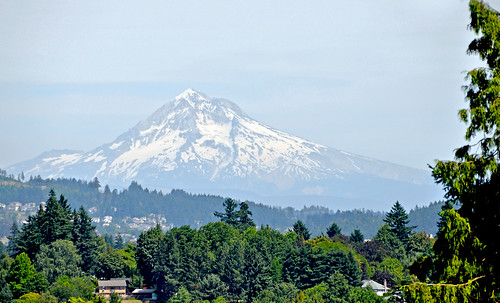
“Settling”
I was welcomed here—clear gold
of late summer, of opening autumn,
the dawn eagle sunning himself on the highest tree,
the mountain revealing herself unclouded, her snow
tinted apricot as she looked west,
Tolerant, in her steadfastness, of the restless sun
forever rising and setting.
Now I am given
a taste of the grey foretold by all and sundry,
a grey both heavy and chill. I've boasted I would not care,
I'm London-born. And I won't. I'll dig in,
into my days, having come here to live, not to visit.
Grey is the price
of neighboring with eagles, of knowing
a mountain's vast presence, seen or unseen.
-Denise Levertov
I’m spending the day at a Centering Prayer retreat in a beautiful setting that’s owned by our Episcopal Diocese. The chapel and gardens overlook the Willamette River, which runs right through the middle of Portland. From the west side of the river, there are breathtaking views (on a clear day) of Mt. Hood, the highest point in Oregon and only about fifty miles east. (The above picture is taken from these gardens, borrowed from someone's Flickr.) I’m a little jealous today, for there is nothing to be seen but clouds east of the river. Regardless, I consider myself lucky to have found a sunny bench in the midst of tall trees on this cloudy day in order to journal my thoughts. Portland, it seems, is cloud-trap, a deep valley surrounded by mountainous terrain. Still, we have our clear days, days when mountains that are hundreds of miles away in the Cascade range seem close enough to touch. Not to give cloudy, coffee-shop days a bad rap, but those crystal clear days are really quite something. Of course, it’s a package deal. Perhaps this is why I’m especially drawn to Levertov’s poem; this is the agreement I have made with beauty. “Grey is the price…of knowing a mountain’s vast presence, seen or unseen.” And if you'll forgive the extended metaphor, perhaps this is why mountains are helpful for understanding our relationship with God, however common and familiar the analogy may be.
Back in the chapel, I sit in silence in a circle of fellow pray-ers. By faith, I know that we are in the midst of God; in a sense, we are in God, yet we may only catch a glimpse. Maybe there are days, those rare days when God’s love is especially felt or sensed, but today (and probably most days) shrouded by clouds, only knowable by a faithful prayer that says, “I will sit.” Or, as the speaker of the poem declares, “here to live, not to visit.”
It is my prayer to continue to know God in this apophatic way, with greater sincerity and fidelity… and maybe just a glimpse here and there.
